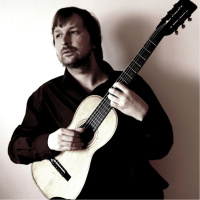

Czech Oak
Podještěd Museum
Jers Duo
Admission fee voluntary
Performers
Jaroslav Pelikan – flute
Jaroslav Novak – guitar

Program
G. Ph. Telemann – Sonata in C major
F. Benda – Sonata in F major
W. A. Mozart – Andante in C major
A. Dvořák – Sonatina Op. 100 (transcription of the Jers-duo from the original for violin and piano)
G. Fauré – Fantaisie Op. 79
M. Ravel – Habanera
J. Pelikán – Agua e Vinho – variation on a theme by the Brazilian composer E. Ghismonti
J. Novák – Suite(Festive Tears, Song and Hesitant Girl)


Program
G. Ph. Telemann – Sonata in C major
F. Benda – Sonata in F major
W. A. Mozart – Andante in C major
A. Dvořák – Sonatina Op. 100 (transcription of the Jers-duo from the original for violin and piano)
G. Fauré – Fantaisie Op. 79
M. Ravel – Habanera
J. Pelikán – Agua e Vinho – variation on a theme by the Brazilian composer E. Ghismonti
J. Novák – Suite(Festive Tears, Song and Hesitant Girl)
Jaroslav Novák
(1968, Prague) is a guitarist, singer, composer and teacher. He studied cello as a child and has been playing guitar and composing since the age of thirteen. He graduated from the Jan Kepler Grammar School and the Conservatory in Prague, majoring in guitar and composition. He finished his studies in 1995 with Concerto for guitar and rock orchestra. In 1984, together with flautist Jaroslav Pelikán, he founded the ensemble Jers-duo, which focuses on the interpretation of classical and his own works. The duo released an original CD , Mlčenlivé příběhy (Silent Stories), in 1993 and in 1996 became a laureate of the Young Prague competition. Jaroslav Novák occasionally collaborates in the studio and on stage with leading Czech symphony orchestras, groups and ensembles of various musical genres. Since 1998 he has been teaching at the Prague Conservatory. He has composed numerous works for guitar – concertos, sonatas, suites, etudes – and is the author of the 70-minute rock Symphony in E. He sets modern Czech poetry (about 250 songs) and occasionally composes music for theatre, film and television. Since 2009 he has been performing his own original programme, which brings together both his guitar and songwriting.
Jaroslav Pelikan
(1970, Prague) is a flutist and composer. From childhood he was a member of the Kühn Children’s Choir, where he acquired a deep relationship to music. He studied flute at the Prague Conservatory with Prof. Jiří Riedlbauch and composition with Prof. Jiří Feld, then continued his studies at the HAMU with Prof. František Čech and Prof. Jiří Válek, and composition with Prof. Václav Riedlbauch and Prof. Jiří Filas. In 1992-93 he worked in Brazil and since 1996 he has been the principal flutist of the National Theatre Orchestra. As a soloist he has performed with many orchestras – among others with the National Theatre Orchestra, PKF, the East Bohemian Philharmonic Orchestra Pardubice, the Talich Chamber Orchestra, the North Bohemian Philharmonic Teplice, the Karlovy Vary Symphony Orchestra and the Brazilian Orquestra da camera do Pará. He has also performed as a soloist in Japan, Brazil, Germany, Hungary, France, Italy, etc. Together with Jaroslav Novák he forms the Jers-duo, with whom he recorded the CD Mlčenlivé příběhy (Silent Stories). Last year he was invited as a professor to a masterclass organized by the Federal University in Brazil. As a composer, he is mainly devoted to instrumental music – he has written concertos for oboe, flute, guitar and bassoon (e.g. a concerto commissioned for the Prague Spring 2002 competition), a wind quintet, Stabat Mater, Symphony in B flat major, Bethlehem Mass, etc. He composed Sonatina for the Prague Spring Oboe Competition. He currently plays the A wooden flute. Braun.
Czech Oak
The history of Český Dub, a picturesque town in the heart of Podještědí, dates back to the 13th century, when it was founded as a market settlement at the monastery of the Johannites, founded by the important Czech Grand Duke Havel of Lemberg and his wife St. Zdislava in 1237. The town has many monuments referring to the important past of the town, which was personally visited in 1357 by the Czech King and Roman Emperor Charles IV. Among the numerous sights, the Renaissance, Art Nouveau Town Hall, the Church of the Holy Spirit and the extensive remains of the medieval city walls with the Hláská (the Hláská) are worthy of attention, especially the unique Romanesque-Gothic premises of the former Johannine Commandery.
When visiting Český Dub, don’t miss the guided tours of the Podještěd Museum, housed in the architecturally valuable Blaschka Villa. The museum offers its visitors several remarkable expositions, including a separate exposition of the Johannine Commandery. In the museum, you can take a look into the extraordinary private and social world of the important Czech writer Karolina Světlá, whose life and work were linked to Podještěd, discover the Czech-Kodubian episode of the composer Bedřich Smetana, and visit a reconstruction of the historical environment of the nearby Světlá fast, the interior of a traditional Poděštěd country cottage and the apartment of the original owners of the present-day museum building – the representative Blaschka Villa, enter the studio of painter, graphic artist and art teacher Petr Dillinger, see the treasures of the Jewish community of České Budějovice from the late 18th century. The local association of the Czech Beseda or the Poděštěd school from the turn of the 19. and 20th century.
During your walk through the Czech-Koduby Museum, you will also see a unique exhibition of Gothic stencils, including an original, stencil-decorated cabinet from the late 15th century, and especially the unique medieval spaces with the unique history of the local Johannite commandery – the monastery of the Knights Hospitaller Order of St. John the Baptist, lost for ages and rediscovered in 1991. The exhibition of the commandery includes, among other things, a replica of a very rare Romanesque relic cross, which was found in one of the graves in the middle of the monastery courtyard.
Český Dub still retains its unmistakable genius loci, living its history, folk tradition and modern culture. The small town in the charming foothills of Ještěd definitely has something to offer you and looks forward to your visit!

